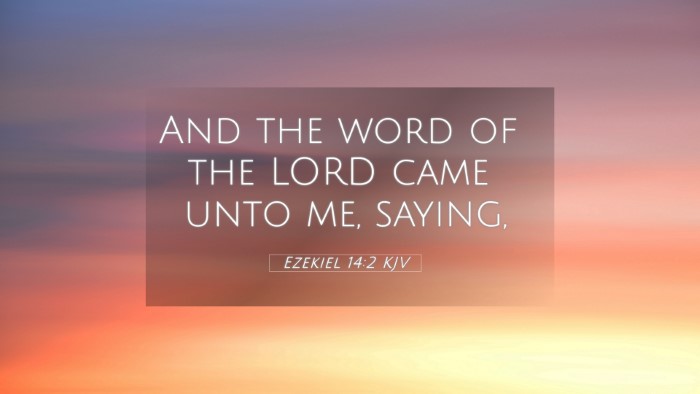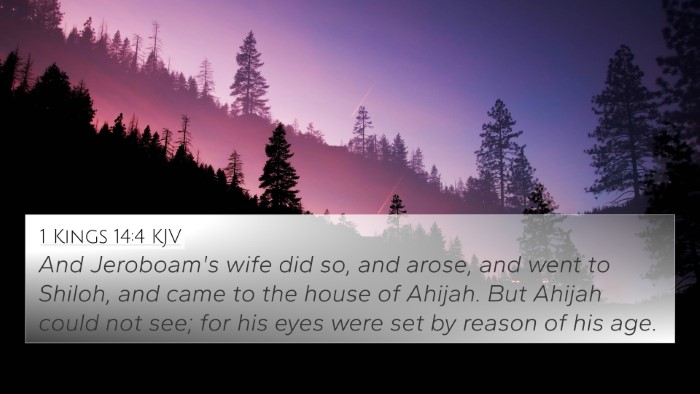Ezekiel 14:2 - Understanding the Meaning
The verse Ezekiel 14:2 states:
"And the word of the Lord came unto me, saying."
This verse serves as a critical introduction to the prophetic message that follows, emphasizing the theme of divine communication and the responsibility of human response to God's guidance.
Summary of Insights from Public Domain Commentaries
Matthew Henry's Commentary
Matthew Henry emphasizes that the pronouncement of the Lord indicates God's continual engagement with His people. The phrase "the word of the Lord" signifies that God is not silent; He actively communicates to guide His followers in times of crisis. Henry suggests that this verse marks a transition into prophetic warnings about the impending judgment due to idolatry and disobedience.
Albert Barnes' Notes
Albert Barnes interprets this verse as introducing a crucial message regarding the nature of divine judgment. He points out that God's word is delivered through a prophet, signifying both authority and urgency. Barnes notes that the context is critical, where the prophet acts as an intermediary, conveying God's serious intention to address the sins of Israel, particularly in the face of their reliance on false idols.
Adam Clarke's Commentary
Adam Clarke adds that the phrase indicates the prophetic calling and the necessity of listening to God's instruction. He underscores that the subsequent content will reveal the reason for God's displeasure and serves as a call for repentance. This verse also sets the tone for understanding the gravity of ignoring divine warnings.
Key Themes and Connections
This verse highlights several significant themes found throughout the scripture:
- Divine Communication: God's desire to communicate with humanity is evident, portraying His care and intention to lead.
- Prophetic Authority: The role of the prophet as a messenger of God's will underscores the seriousness of the message delivered.
- Judgment and Repentance: Anticipating judgment based on the people's actions emphasizes the need for repentance and alignment with God's commands.
- Faithfulness to God: The call to maintain faithfulness amidst distractions, such as idolatry, resonates throughout the scriptures.
Bible Cross-References
Understanding Ezekiel 14:2 is enriched when we explore related scriptures. Here are some relevant cross-references:
- Jeremiah 1:4-10 - God's call and message to Jeremiah as a prophet.
- Amos 3:7 - God's decision to reveal His plans to His prophets.
- Isaiah 1:18 - God's invitation to reason together, emphasizing the opportunity for repentance.
- Ezekiel 3:17 - The watchman metaphor highlighting the responsibility of prophets.
- Hosea 12:10 - God speaks through prophets and visions, reinforcing the prophetic message.
- 2 Peter 1:21 - The inspiration of prophets by the Holy Spirit to communicate God's message.
- Acts 3:18 - The fulfillment of prophecies concerning Christ, linking prophetic messages across scriptures.
Understanding Through Cross-Referencing
Cross-referencing offers tools for Bible study and understanding by linking verses and themes. It's essential to consider:
- How each verse connects to a broader narrative within the Bible.
- The thematic continuity between Old Testament prophecies and New Testament fulfillments.
- Cross-referenced themes such as repentance, judgment, and divine guidance found throughout the texts.
Conclusion
Ezekiel 14:2 serves as a powerful reminder of God’s initiative in addressing human sin and the necessity for believers to heed divine warnings. The connections between this verse and related scriptures enrich one’s understanding of the overarching narrative of God's desire for relationship with His people. By engaging in comparative Bible verse analysis and thematic connections, believers can deepen their faith and comprehension of scripture.




